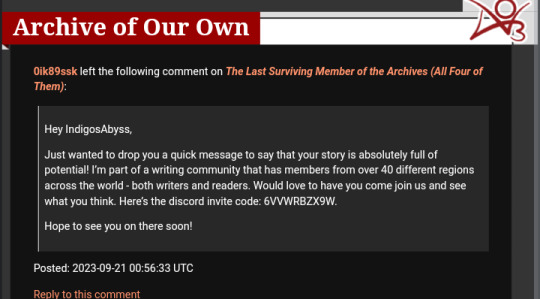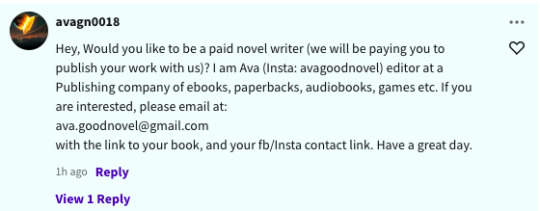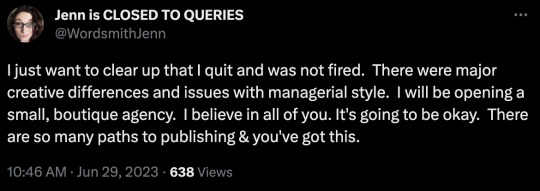#writer beware
Text

#writers#writeblr#writing community#writers on tumblr#writing memes#inglorious basterds#german three#an agent will never send you an email or dm first#writer beware#literary agent#sorry fellow jewish writers but this movie is GOLD
16 notes
·
View notes
Text
Writer Beware: How a Book Really Becomes a Movie.
Writer Beware is an excellent site of information for those who are or want to become traditionally published. The official blog of Writer Beware® shines a bright light into the dark corners of the shadow-world of literary scams, schemes, and pitfalls. Also providing advice for writers, industry news, and commentary. Writer Beware® is sponsored by the Science Fiction and Fantasy Writers Association.

by Victoria Strauss, April 12
Book-to-film scams are extremely common these days. If the publishing industry is opaque and secretive, the movie biz is even more so, and scammers take full advantage.
From disreputable marketers claiming to take your book to pitch events, to fake agents offering to represent you to major production companies, to scammers impersonating those production companies themselves, hordes of fraudsters are soliciting writers by phone and email with tempting-sounding "offers" and "opportunities" that they promise will route your book directly to the silver screen.
In reality, of course, the fraudsters have no Hollywood connections. The sole aim of these solicitations is to trick you into paying large amounts of money for products or services--screenplays, pitch decks, "cinematic trailers", and more--that you don't need and that may not even be delivered.
How to defend yourself? As noted by Jeanne Veillette Bowerman, today's guest post author, the best way to avoid being scammed is to understand the process. The more you know about how things should work, the easier it will be to recognize questionable or dishonest practices when you encounter them.
In the article below, Jeanne offers a comprehensive overview, unpacking the multiple and often complicated paths by which a book really finds its way to the screen...which, as you'll see, bear no resemblance to the shortcuts and guarantees claimed by fraudsters.
*~*~*~*~*
How a Book Really Becomes a Movie
by
Jeanne Veillette Bowerman
Anyone passionate about their work, desperate to get published or have their book adapted to film, is a perfect target for a scam. Like this one.
First, if you’ve fallen for one of these too-good-to-be true solicitations, don’t beat yourself up. It’s easy to do. Writers tend to be solitary creatures, many without a support system. That's what makes us vulnerable to exploitation. But the best way to protect ourselves is to understand how the book-to-film process works.
Get comfortable. There’s nothing simple about Hollywood.
The filmmaking industry baffles many—even those working in it. The reality is, there is no single way to get a film made. There are quite literally as many ways to break in as there are writers who’ve successfully done so, making scams harder to identify.
Sadly, when someone proactively reaches out to you, you have to assume it’s fake until you can prove otherwise. With scams abounding, the burden of proof has shifted. Due diligence has never been more important.
You do NOT need a screenplay to sell your book-to-film rights.
You do NOT need a sizzle reel or "cinematic trailer".
You do NOT need storyboards.
You do NOT need mood boards.
You should NOT have to pay any upfront fees.
You should NOT be required to buy anything.
Let’s go through the traditional paths first, then I’ll share an unusual story to demonstrate how varied this process can be.
Most common paths for book to film
What you need is a great story with cinematic elements that would attract a large audience. If it’s for TV, it should have compelling characters and a broader world that could translate to multiple episodes.
Your agent strives for one of three opportunities:
Sell the book-to-film rights directly to a studio or producer,
Option the book for a set dollar amount for a specific period of time, or
Sign a shopping agreement for a shorter period of time with no money being paid to the author.
1. Selling the Book
When you sell your book outright, that’s it. You’re done. You no longer have any claim to said material, nor the right to participate in the adaptation. You probably won’t be able to write a future sequel if the studio owns your intellectual property … which means they own your characters. There are exceptions though, depending on how the contract was negotiated. You definitely need a talented agent or attorney to assist … not a pitching or consulting “service” that solicits you via email.
The sale price typically will be 2-3% of the film's budget (that's money paid to you, not the other way around), but it depends. It always depends. Your agent should at least try to get you Executive Producer credit, or a consulting gig. But many producers want the author far, far away from the project. Your book is merely a blueprint for the film. A lot will change—subplots and characters will disappear—which can be difficult for the author to accept.
If you’re lucky, and have the proper experience and background, they’ll give you first crack at writing the script. But don’t expect it. Your payday is the sales of the rights plus more copies of your book being sold.
But … here’s the hard part … even if you sell your book, the movie may never get made. Yes, you read that correctly. It takes millions of dollars and hundreds of people to align to make a film. People often say it’s a miracle any film gets made. They’re right.
2. Option Agreement
An option by a showrunner or producer usually runs $1,000 to $30,000 for a set period of time (again, that's money paid to you), the standard being 12 to 18 months. This gives them time to “package” the project by attaching a director, actors, etc. and (hopefully) sell it. Note: It is illegal to not pay a writer for an option, hence why you’ll sometimes see an option happen for a penny or a single dollar—which is more common when optioning a screenplay, as opposed to a book.
The vast majority of options expire long before any movie deal can be struck, but they may be renewed for an additional fee. With each renewal, your agent will likely either ask for more money or less of a time commitment. I do know authors who have optioned the same novel multiple times—not a bad payday. But still, no film and no purchase of book-to-film rights ever happened in those cases. An option doesn’t guarantee you a sale.
3. Shopping Agreement
A shopping agreement is similar to an option, only the producer tries to shop it around town without paying the option fee. Since the author receives no money, the shopping agreement typically lasts only six to nine months. Renewable, just like options.
These are more common than traditional options because the producer gets exclusivity, albeit for a shorter period of time, without coughing up money. Authors might agree to this strategy simply because there’s some sense of hope that a deal will be made.
So, how do your book-to-film rights get sold?
Just like everything else in the industry, you need relationships with the right people. Agencies spend years fostering those relationships with production companies and will go directly to them to pitch the book, sometimes in person, sometimes with a phone call. They’ll set up meetings with producers, not junior execs. Junior execs are the ones who go to pitching events, not decisionmakers.
Usually, an agent only needs a logline or a one-sheet. A logline is a one- to two-sentence elevator pitch. A one-sheet is exactly what it sounds like—a single page that summarizes the book and gives details about the author. That’s it. What your agent will not do is spend money to hire a screenwriter or hire someone to create a sizzle reel, trailer, or story boards.
If a potential sale is on the table, your agent should negotiate development fees, as Hollywood famously tries to get writers to do development work for free. Get your agent to negotiate compensation for that. An agent might also ask for the title card on the film not to be buried and to also be able to use key art of the movie poster for the book cover.
Before any significant negotiations happen, they’ll want to know there is a clear chain of title, meaning must prove you own 100% of the property. This is where having a screenwriter adapt your book in advance muddies the waters. If you didn’t pay them to adapt it, and have it in writing that you own the script, you’ve now entered into a trickier situation where the producer might have to pay both you and the screenwriter.
Moviemaking is a business. As in any business, people want things clean and simple. So, say you fall for one of those scams where you split the cost of hiring a screenwriter, making a sizzle reel, and creating story boards. That scammer could potentially now own half of your work. No exec is going to touch that with a 10,000-foot pole.
The most popular word in Hollywood is “no.” Don’t make it easy for them to say it.
The author may, however, take a stab at writing the script themselves. I’ve had top producers at the New York Rights Fair tell me they actually prefer having an author’s rough draft for several reasons—it saves them development money, and they appreciate having the author slashing the story down themselves. Less room for arguments later.
Author Lee Matthew Goldberg has both adapted his own book as well as optioned another. “I've been told, with my Runaway Train project, with the actress attached, that my script is what gets the project in the door. And then ultimately, it's most likely not going to be my script [that gets produced] when it actually sells. But had I not had a script, and it just was the book, it might have been harder to sell … Hollywood doesn't like to read. It's easier for them to read a script than a book. So, I think it's in the best interest for an author to write the screenplay. Be open to the fact that their screenplay might just be the thing that gets them over the first hump.”
But brace yourself. Hollywood isn’t going to wrap their arms around you, as the screenwriter. You will get fired, and they will bring in a pro screenwriter. However, per WGA rules, if you’ve written that original draft, you’ll get a shot at the first rewrite … before they finally fire you. But you will be fired. Don’t be offended though. Every great A-list screenwriter has been fired. It’s how the business works.
What if you’re self-published and/or don’t have an agent?
Let’s say you’re self-publishing and query producers yourself, and they bite. That producer is not going to take your book to a pitching event (a common scammer claim). They have direct contacts with people in the industry and will set up a meeting.
Again, you could take a stab at writing the screenplay, enter it into contests (see below), pitch to actors' production companies, or query screenwriting managers.
If the script gets sold, they’ll still fire you. See above.
The case study: The Reincarnationist Papers
Buckle up … this is but one example of how long it takes to go from book to film … and how totally unpredictable the process can be.
In 2009, Eric Maikranz wrote and self-published The Reincarnationist Papers. On the first page of the book, he put a “bounty” on it, stating that whomever finds this book and can help get it sold to a major publisher or movie studio will get 10% of his take. Great marketing!
Years later, while on vacation in Katmandu, a producer, Rafi Crohn, finds the book on a shelf of a bathroom in a tea house—no idea how it made it all the way to Katmandu—reads the “bounty,” and that alone intrigues him enough to dive into the book. Loving it, he tracks down Eric and secures an option.
It’s now 2012. Rafi contacts Ian Shorr, a professional screenwriter who feels, “There’s something magical there … an element of Willy Wonka.” Ian then pitches his take on how to adapt the book to Imagine, Ron Howard’s production company. (Note: This is how open writing assignments work. Before paying a screenwriter, execs ask them to read the book and pitch their take.) In this case, they don't go for Ian’s vision. He pitched a Matrix version; they want a Harry Potter version. Imagine never finds a writer’s idea they can align with.
Movie is dead.
Almost two years later, the rights are about to lapse again, so Rafi, who liked Ian’s take, approaches him to see if he’d be game to write the script on spec (which means without pay).
Why would a pro screenwriter write for no money? Ian explains, “For me, it was like the one that got away came back … I was still thinking about that book.”
Ian’s manager re-ups the rights.
Since Ian is writing this on spec, obviously, he is concurrently working on projects that actually pay him. Go figure. And The Reincarnationist Papers is a complicated one to adapt, taking Ian about three years to finalize the script.
The script and the rights to Eric’s book finally get purchased by Paramount.
Time to celebrate, right? Nope.
Immediately after the script gets sold, the president of Paramount leaves, and the new head sees the $200-million price tag and crosses it off their slate. The book was not a best seller, and the risk is too high.
As Ian puts it, “This movie died a million times before it lived.”
What brings it back to life: the director Antoine Fuqua, about to do a film for Paramount, is craving to do a Matrix-type project, but was brought on to direct something else. A producer slips Antoine the script Ian wrote, now called Infinite. Antoine loves it, and tells the studio this is the one he wants to make. Total fluke. The right champion at the right time. Finally.
Again, relationships.
Ian writes more drafts for Antoine, they cast the movie, lose the star, get another star, shoot it in 2019, and it finally gets released in 2021. Just a short 12 years from book to film.
Ian sums it up, “I think a lot of writers don't understand that their work is going to change. They all want the adaptation for all those other reasons that Eric enjoyed—like book sales, publishing deals, sequels. But some writers definitely do struggle with the fact that there are changes. The second you get into bed with Hollywood, that's the first thing you have to be prepared for. Because the spec that I wrote was very different from the book that he wrote. And then my spec got rewritten by other writers, who changed what I wrote.”
There are thousands of stories similar to this … and also very different.
You can watch Ian discuss the adaptation process on Pipeline Artists here.
Oh, there are still more out-of-the-box options …
Have you heard of “The Book Whisperer”? Meet Lane Shefter Bishop. (You can find an in-depth one-on-one conversation I had with her on Pipeline Artists’ Symposium here.)
In short, Lane has relationships (there’s that word again) with literary agents and will often get a shopping agreement on the book prior to it ever being published. Her goal is to be able to mold the story, pre-publication, to help create a more cinematic experience, structured like a movie.
Frankly, it’s genius. Give the conversation a listen.
Pay-to-play versus true champions
Let’s go back to “What do I do if I don’t have an agent?”
There are more and more writing contests popping up that won’t lead you anywhere except a few dollars less in your pocket, but reputable ones absolutely exist. Full disclosure, I’m a Senior Executive at Pipeline Media Group, a company that discovers novelists, screenwriters, and filmmakers via contests. Trust me when I say I’ve heard all the arguments about contests being pay-to-play scams, but it’s not the case for most, so do your research on the top platforms.
I’m also a writer, and I’ve entered plenty of contests in my day. Some have propelled my career, others, despite being a finalist, did absolutely nothing for me. They didn’t even email me to inform me of my selection!
Just like with any opportunity that feels too good to be true, as mentioned, do your research.
Beyond reading a contests’ success stories, I always recommend doing a search for a contest’s past finalists. Follow them on social media and message them, asking what that contest actually did for them. Getting previous finalists’ feedback on their take will tell you everything you need to know.
Get more than one perspective though. Get as many as you can! Strike the most positive, and strike the most negative. Take the average, and you can be confident in the results. Writers will be honest with each other. And if they got screwed over, they’ll be more than happy to tell you!
Bottom line
Scams are everywhere. The best way to identify them is to know how the process actually works.
Hollywood loves adaptations for many reasons, but mostly because the bulk of the story development work is already done, and a dedicated fan base exists. So, cast out as many nets as possible, even if it means writing the script yourself.
Why not? No one knows your story as well as you do.
If you want outside help, please do your research. Check multiple references, not just one. The Golden Ticket isn’t going to drop in your inbox. If it sounds too good to be true, it’s a scam.
Above all, trust your spidey senses.
I’ll leave you with Ian Shorr’s final advice: “Because writers are so passionate, and because we're so willing to work for free, and because it's such an aspirational, dream-based industry, it makes us a really easy target for scammers. Plus, the way that Hollywood operates is so opaque to people who don't work there. It's easy for someone to come along and say, oh, yeah, this is how you play the game. The reality is, if you write something that people love, they will come to you. And they will put their energy into it. Just remember, anybody who’s looking for you to pay them is a red flag."

Jeanne Veillette Bowerman is a Senior Executive at Pipeline Media Group and Book Pipeline, Editor-in-Chief of Pipeline Artists, co-host of the Pipeline Artists original podcast, "Reckless Creatives," former Editor-in-Chief of Script magazine and a former Senior Editor at Writer's Digest. Her Script column "Balls of Steel" was selected as recommended reading by Universal Writers Program. A compilation of her articles is now available—Balls of Steel: The Screenwriter's Mindset. She is also a partner at Fringe Press and Co-Founder and moderator of the weekly Twitter screenwriters’ chat, #Scriptchat. She wrote the narrative adaptation of the Pulitzer Prize-winning book, Slavery by Another Name: The Re-Enslavement of Black Americans from the Civil War to World War II, with its author, Douglas A. Blackmon, former senior national correspondent of The Wall Street Journal and has now ventured into writing historical fiction. Follow Jeanne on X: @jeannevb
#writblr#writers on tumblr#writing community#writers of tumblr#writing advice#writing tips#writer beware#screenwriting#screenplays#writing scams#publishing scams#writer#writers#writerscommunity#books to movies
3 notes
·
View notes
Text
Resources for Researching Agents
When it comes to agents, we are constantly telling each other to do our research and due diligence to make sure we're making the best decision possible. But so much of publishing is opaque, and so much discussion of bad actors is hidden in whisper networks.
So, besides this blog, which I'm doing my best with but is far from comprehensive, here are other resources to scour.
Publisher's Marketplace
This is absolutely essential to consider because it shows sales histories for individual agents and agencies, and you can see which publishers and imprints they are selling to. It is unfortunately a paid service ($25/mo) but they have a day pass to just do some binge-researching ($10). If you have writerly friends you can split and share with, that's even better. But more importantly, I have a subscription; if money is an obstacle and there's ever anything you want to look up, feel free to send me a DM or ask here and I will look into it for you. I'm not about gatekeeping or paywalling information.
Query Tracker
QueryTracker is a great tool for querying, and the most valuable aspect in my opinion is the comment section for each agent. Read as far back as you possibly can for a given agent if you're considering an offer of rep.
Writer Beware
This is often more for big scams rather than warning bad treatment from established agents, but it's still an invaluable resource.
Absolute Write Forums Agency Index
This forum can be overwhelming to dig through since it goes back as far as 2004, but in general, looking at the more recent posts on a given thread from the past few years for an agency can give really good information.
Social Media & Other Writers!!!
This might not seem helpful when I can't exactly link you to my group chats and writing communities, but it's absolutely vital you find your own support network so that you can compare experiences. When you get an agent offer, it's an industry norm to ask them for client references to talk to, but I would go further than that and try to talk to clients (and ex-clients) beyond the people they provide to you. You want to hear from someone who has had a negative experience just as much if not more than the person who has had a success story.
And of course, the Publishing Whispers blog here on Tumblr does its best to keep track of public or widely discussed industry whispers while keeping an open inbox for folks to share their experiences.
18 notes
·
View notes
Text
WebNovel has New Tactics
Ok. Shit. I never thought they'd message me about this.
I'm assuming you've all seen the screenshots of AO3 comments, telling the writer what a great fic they've written and how they can totally put it on WebNovel for $$$ bc it's just SO impressive.
I got something like that. But a little different.

Okay. Weird. Whatever. Even if someone's too formal, I'll still join a server yk?
AJAJSJS

THIS WAS THEIR OFFICIAL DISCORD WTFFF
This feels almost like a bait and switch atop a bait and switch. They'll get you in the server, make some chill friends, offer you a contract, and then trap you for fifty years after your death to work on a story!!!
Or maybe I'm being conspiratorial here.
I've always written niche crossovers and small fandoms, and The Last Surviving Members was my first BIG fic, so of all fics I'm not surprised that this is what got them.
So, I stayed some. Looked around. There's a fanfiction-only channel. Suspicious.
Oh, and no surprise, you can easily be banned just for talking shit.

Which a lot of the newbies were doing so I'm not going to be surprised if they're all gone by today. I just stayed to get all the screenshots that I needed.
There's a LOT of emphasis on making money. Competitions, rankings, classes, guides. And it all comes from them. I wouldn't have a problem with that, but there's an interesting lack of outside opinion and legal support.
They call this style of media distribution "web novel/fiction", which gives them a layer of credibility because they are THE WEBNOVEL SITE.
(I had to change my original fiction tumblr's name bc of this and no im still not over it)
In case you don't know, WebNovel has very predatory tactics in sourcing writers and their contracts are BAD. Like, really bad.
I want to make a career in writing my own stuff, and I was able to get a heads-up before the early whistleblowers started on AO3. If you haven't heard of it, this is a warning to you. And maybe do some of your own research as well.
And... Real talk here. I get it. I get why people go for these contracts. I'm in desperate need for money as well.
My mental health has been very shaky recently. As has my physical health. And I'm not in a position where I can pay for figure out what has been going wrong with me. All of these things have been referenced in author notes on the fic they commented on. It was the fifth chapter, too, so it's not impossible that they read those notes.
I'm hoping that they're not so callous as to do that intentionally and just skipped to the last chapter to make it seem like they read it all, but... This really hurt. Sorry if that's too personal.
9 notes
·
View notes
Text
FYI for my writerly friends out there.
3 notes
·
View notes
Text
Okay but this is important:
So the thing is I would take requests on fic ideas yall want me to write but their are certain restrictions. Some people are really down bad coming up to with the most disgusting ideas ever and stuff. I'm sorry but you want me write a fic on a kpop artist who's your dad's co worker? Or where they are your step dad or step brother? Or the kpop artist cheated on you? Or they are your ex? Or you want a very angsty fic where you're their fucktoy for your goddamned emo ass?. You need help, instead of getting your delusions fulfilled. It's quiet disgusting to think of kpop artists like that and what you are doing is literally indirectly or directly supporting incest, grooming and shit like that. And writers who write that please. get. help. You don't have creativity and it really shows through those kinda disgusting plot with unnecessary objectification of a woman's (reader in this case) body. This ain't 16th century that you'll express shit in that way which is quite misogynistic. YOU'RE WRITING A GODDAMNED FAN FICTION NOT A NORMAL FICTION WHERE YOU OWN THE CHARACTERS. YOU DON'T OWN THE CHARACTERS LITERALLY IN FAN FICTIONS. So fucking stop it.
#late night thoughts#but this is important#writer#writer beware#writer on tumblr#fan fiction#fan fic writing
4 notes
·
View notes
Text

So I've heard of other writing apps trying to poach stories from Wattpad. Wouldn't you know it, I found one in the wild on my story The Vampire's Bride! I just left them a response telling them that I'm posting on Kindle Vella.
I did download the app because there's a mermaid story that sounded good and I love mermaids, but if anyone gets contacted by any of these apps (Goodnovel, Webnovel, Stary/Dreame, etc), do NOT sign a contract with them. Writer Beware has an entire section on this.
3 notes
·
View notes
Text
"The main takeaway from the Guidance can be summarized thus: the only parts of a work that are copyrightable are the human-contributed ones, and the work is not copyrightable if an AI technology determines the expressive elements of the work and the creativity is not the product of human authorship. In cases where there are both AI-generated and human-authored elements, copyright will only protect the human-authored aspects of the work, which are “independent of ” and do “not affect” the copyright status of the AI-generated material."
2 notes
·
View notes
Text
that little voice in your head that says this idea is so good you'll definitely remember it in the morning?
that's the devil
4 notes
·
View notes
Text
125 notes
·
View notes
Text
Erebus:
About me <33
-
Hi, my names Erebus! I'm currently working on 'The lullaby of the sun and the moon' and 'Where the dead leaves rot'. Here's a few things about me:
Favourite thing in the sky: Moon
Favourite weather: Rainy/Windy
Favourite season: Spring/Monsoon
Favourite Artist: Melanie Martinez
Favourite flower: Chrysanthemum/ Hawthorns
Favourite colour: Green
Birthstone: Emerald
Birthflower: Lily of the valley
Birthday: 7th of May
Age: I'm above 13
Sun sign: Taurus
Moon sign: Libra
Personality type: Ambivert/ENTP
Thank you for being here, enjoy <33
-
I'll be posting on this account now, I'll update this as well <33
-
-
Tagging: @roseadleyn, @hadiacake, @that-one-pretty-bitch, @izumi-astra-123, @irene-ashford-00, @achy-boo, @lxdymoon0357, @tm1148, @writerig, @elijahissimplycooler & @calixta-regulus.
#life#writer beware#the lullaby of the sun and the moon#funny shit#i'm bored#i'm sorry#i'm tired#about myself#where the dead leaves rot#we've accepted fate#meeeeee#Spotify
0 notes
Text
Now, in the fallout of Gold Dust Literary's twitter shitstorm, some of their ex-agents are talking about starting their own agencies.

It's vital to note that these agents still have absolutely no publishing experience with any reputable literary agencies or publishing houses.
I do genuinely believe these folks have good intentions; they're not intentionally looking to scam people. But that doesn't change the fact that literary agent roles are based on apprenticeship and mentorship which these folks do NOT have. It doesn't change the fact that working with a bad agent can, at best, stall your career for months or years, and at worst, can tank your opportunities and chances with a particular project.
Anyone can call themselves an agent. It doesn't mean they have the qualifications, tools, experience, or connections to sell your book.
*hand waves* allegedly or whatever
#writer beware#traditional publishing#literary agency#gold dust#gold dust literary#jennifer w williams
4 notes
·
View notes
Text
كيف تُسخِّر التقنية الحديثة لخلق عادة كتابة اليوميات بالورقة والقلم في حياتك؟ [تطبيقان مجانيان]

View On WordPress
#Made-for-advertising sites#Simon Owens#Substack#منصة Substack#موقع أرابنز#نشرة Simon Owens#نشرة Substack#Victoria Strauss#Writer Beware#Writer Beware®#عارف فكري
0 notes
Text
'I look to the stars and ask them about you.'
-Eris
Diary entry
I find it utterly hilarious how we went from spending every moment together to none at all. You lie in a coffin and I lie in our bed, you loved me and I loved you but that wasn't enough, it never was.
I asked God for one thing and that was you, that was love and just as I got comfortable. He snatched it from me, it seems that my mother’s sin never left me. I pay for the price she never paid and I will take it to my grave.
I'm a mean, wicked wench who has taken the men who wronged me to their early graves, kids fear me as they pass fables of my wrong doings. Was I wrong to love you? Was I wrong to get my revenge?
I walk by 'our spot' for the last time and I lay my eyes on the pond that you drowned in. The place where I first kissed you, where you proposed to me.
If we live again, I hope we do and I hope to love you as much as I can.
It hurts to imagine what you went through. Sometimes, I imagine that nothing of this sort happened and you are well and happy but soon my delusion come crashing down.
My heart can not bear this anymore.
.................................................................
Wasn't that fun?
Tagging: @roseadleyn, @hadiacake, @that-one-pretty-bitch, @izumi-astra-123, @irene-ashford-00, @achy-boo, @lxdymoon0357, @tm1148, @writerig, @elijahissimplycooler & @calixta-regulus.
#i'm tired#funny shit#i'm bored#we've accepted fate#i love her#i love you#i'm sorry#them>>>>>#the lullaby of the sun and the moon#i should probably delete this later#<33#my writing#writer beware
1 note
·
View note
Text
The Impersonation List - By Victoria Strauss
(Victoria Strauss for Writer Beware)
The most pernicious scams focused on English-speaking writers these days come from overseas: publishing/marketing/fake literary agency scams from the Philippines, and ghostwriting/editing/marketing scams from Pakistan and India.
That’s not to say there aren’t plenty of scammers in the USA, Canada, UK, and Australia. And scams aren’t all you need to watch out…

View On WordPress
#authors support#beware of scam#help#helpful#information#Informative#re-blog#Scam#scam warning#supportive#Victoria Strauss#warning#Writer Beware#writer&039;s support#writing
1 note
·
View note